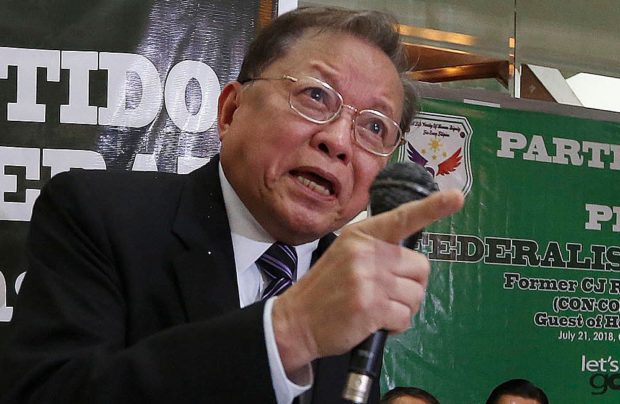Ex-Chief Justice Puno suggests ‘hybrid constitutional convention’

Former Chief Justice Reynato Puno (INQUIRER.net FILE PHOTO)
MANILA, Philippines — Using a “hybrid constitutional convention” — with both elected and appointed members — to amend the Constitution will allay the fear that members of political families will get elected into the body.
Former Supreme Court Chief Justice Reynato Puno made the suggestion on Monday as one of the resource persons at the hearing of the House Committee on Constitutional Amendments.
Such a hybrid body, he said, would be balanced as experts who are not part of political dynasties would also be members.
“I respectfully submit that the best way to amend or revise the constitution is through a constitutional convention. But I am not suggesting the traditional constitutional convention where all the members are elected by the people,” Puno said.
“Given the seeming deterioration of our political processes, there is the lurking danger that the elected delegates to a constitutional convention — and pardon me for saying it — will just be proxies or factotums of political dynasties and economic oligarchs… I, therefore suggest to Your Honors that they call for a hybrid constitutional convention — hybrid in a sense the membership of the constitutional convention will come from elections and from appointments,” he added.
Article continues after this advertisementEnsuring nonpartisanship
According to Puno, Congress can figure out how many seats will be allocated for elected and appointed members of the convention.
Article continues after this advertisementAlso, appointments would be made by both the executive and the legislative branches, to ensure that the executive would not have the sole power over the selection.
“X number of seats may be filled up by election and another X number may be filled up by appointment. There should be a process in both election and appointment in order to make sure that the election is nonpartisan, in order to make sure that the election will not be costly,” Puno explained.
“On the other hand, the appointees should be strictly vetted to ensure their expertise and to ensure their nonpartisanship. The body that will undertake this important vetting can be composed of representatives from the executive and the legislature. In other words, the power to appoint these experts will not be monopolized by the executive,” he added.
Puno also noted the advantages of a hybrid system, saying: “This hybrid model has been used in other countries with no serious constitutional issues raised against it. This model will assure a constitutional convention that is both independent and competent.”
Voting for constitutional amendments
Puno made these suggestions during the earlier part of the hearing, during which several bills calling for constitutional amendments were tackled.
After the resource persons were given the time to speak, a committee report on a still unnumbered resolution of both Houses calling for a constitutional convention was approved by the panel.
Sixteen lawmakers voted in favor of the unnumbered committee report, while three lawmakers voted against it, and one abstained.
This means that if the resolution is ratified by both the House and the Senate, a constitutional convention with members elected by the people will be used.
In contrast, a constitutional assembly would have made use of the current Congress.
The House Committee on Constitutional Amendments has already conducted several hearings on the proposals seeking constitutional revisions.
Several legal luminaries claim that the time is right to amend the Constitution. Others fear that the two primary goals of charter change — amending term limits for elected officials and removing restrictive economic provisions — will hurt harm national security.